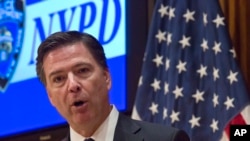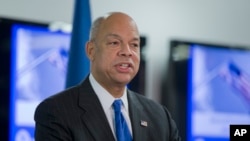President Barack Obama will hold private meetings Friday with families who lost loved ones in the December 2 California massacre that killed 14 and wounded 22 others.
The White House said Wednesday that Obama would stop in San Bernardino on his way to spend Christmas in Hawaii. Spokesman Josh Earnest referred to the president as the "consoler-in-chief" who several times has had to meet with victims' families and survivors of mass shootings.
Also Wednesday, FBI Director James Comey said U.S.-born Syed Rizwan Farook and his Pakistani wife, Tashfeen Malik — the couple who carried out the massacre — made a commitment two years ago to launch an attack even before they met in person.
Comey said authorities had determined that in late 2013, Farook and Malik had direct private Internet conversations "sharing their joint commitment to jihad and martyrdom."
However, he said, "We still see no contact with foreign terrorist organizations" ahead of their attack on a local government center in San Bernardino, California.
"We still do not see that they were part of an organized cell of some sort or other parts. Still want to know where they were for four hours [after the attack] and what else were they planning to do and was there anybody who helped them or assisted them in some way,” Comey said.
Police killed the couple, who were apparent followers of the Islamic State group, in a barrage of gunfire exchanged with them.
The FBI director said that while the couple sent private messages to each other, there is "no evidence of postings on social media." After three background investigations, Malik was cleared for entry into the United States on what is known as a "fiancee visa," a document that required the couple to get married within 90 days of arriving in the country, which they did last year.
New terror alert system
Comey's latest comments on the worldwide investigation of the couple and the attack they carried out at a holiday gathering of Farook's co-workers came as U.S. Homeland Security chief Jeh Johnson unveiled a revamped terrorism alert system.
The U.S. ended its system of color-coded terrorism alerts in 2011, replacing it with occasional public announcements about possible "elevated" or "imminent" threats. Now the government plans to also issue periodic "bulletins" it says will describe "broader or more general trends" about possible terrorism threats, situations the government considers something short of elevated or imminent concerns.
“We want to put in one place for the public to see what we are seeing concerning the homeland, what we are doing about it and what the public can do about it," Johnson said.
He said the Homeland Security agency "is especially concerned that terrorist-inspired individuals and homegrown violent extremists may be encouraged or inspired to target public events or places.”
Johnson said the agency is stepping up its monitoring of social media sites to check for possible indications of support for terrorist attacks before allowing immigrants to enter the United States.






